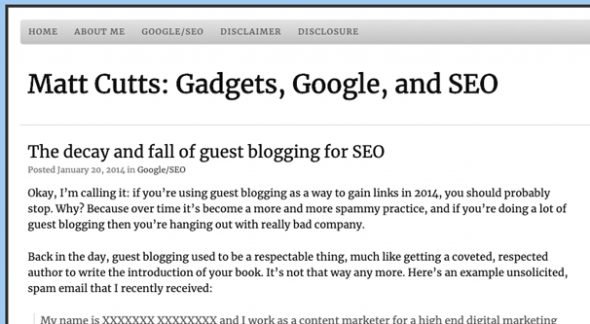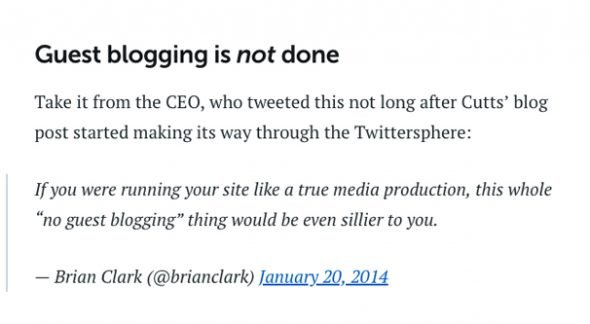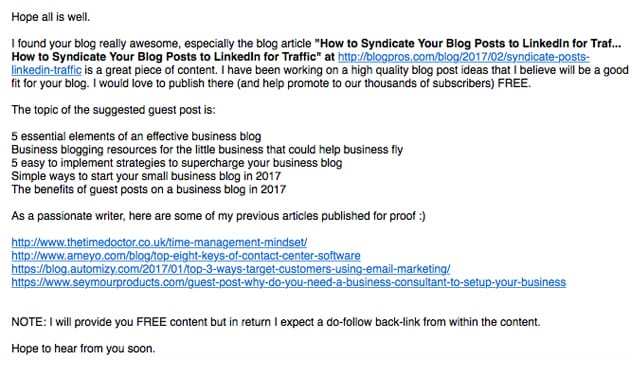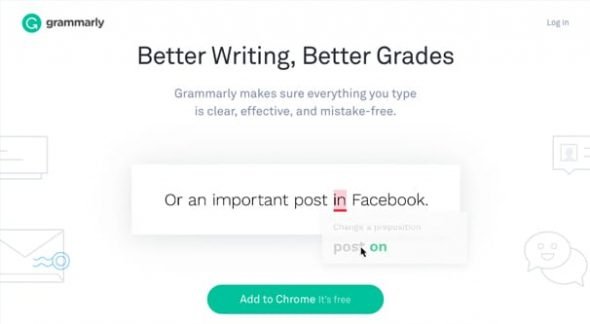It’s probably not necessary to link this post again, but I’m going to do it anyway. Way back in the days of yore, the fabled and far-off misty age of 2014, a man named Matt Cutts was the head of Google’s webspam team. In addition to his duties internally, he was the public face of Google for marketers. Matt produced regular videos and wrote regular blog posts about various forms of web marketing and SEO. He kept us up to date on what Google was doing to fight spam, what major algorithm updates meant, and what we could all do to improve our marketing.
Matt eventually moved on from Google, joining the United States Digital Service as acting administrator and eventually being appointed full administrator in 2018. His career, however, isn’t the important part here. What’s important is one particular article he published on his blog.
The article in question can be found here and is titled “The decay and fall of guest blogging for SEO”. This post, backed with the authority of Google, threw the marketing world into chaos. Websites crashed. Marketers burst into flames. Content was retroactively deleted. It was the beginning of an age of darkness.
Alright, so, it wasn’t really that bad, all things considered. What Mr. Cutts did was explained that a certain style of SEO technique, the low quality guest post, was no longer going to be a viable technique.
The technique in question generally meant just sending out emails to thousands of blogs, from Forbes to BestSEOTechniques.biz.info, with the same offer. “Allow me to write a blog post for you and I will provide you with good* content. All I ask in return is a followed link.”
Good, of course, being unlikely to be true. Most of the people using this technique stole content, or spun some existing content, or wrote something that barely passed muster back then, let alone now. The value proposition for a publisher only really came in through laziness. You would get a piece of content you didn’t have to write, and you didn’t have to pay for it? What a deal!
What Matt Cutts did here is warned off the worst guest posters and warned publishers that such techniques would no longer be viable. It was more of a threat than anything, and as we can see with modern marketing, it didn’t really work.
Oh, guest posting was shaken up a lot. The announcement led to a huge number of blogs closing guest contributions entirely. Many, afraid of what Google could do, even went back and deleted their old guest posts just to be safe. Many of the guest post automation platforms and businesses folded overnight.
This post instilled furious debate amongst marketers almost immediately. Some people shied away from guest blogging entirely, taking Mr. Cutts at his word that guest blogging was dead. Even if it wasn’t dead immediately, this was heralding some major change in the Google algorithm that would kill off the value of that old content. Since this was only a couple of years after the major Panda and Penguin algorithm updates, there was serious precedent for major shake-ups in web search organization.
Other people argued almost immediately that guest blogging isn’t done at all. What Google hates and what Matt Cutts was explaining is that the idea of poor quality guest posts working for SEO was done. The ability to contribute to other sites is not something they can ever truly restrict.
Two Scenarios
Now, let me ask you a question. I’m going to give you two situations, and I want you to tell me the difference between the two.
- You own Site A. You write a piece of content and have that content published on Site B, a related but not associated site that you do not own. Since it’s relevant, you include a link to Site A in your content.
- You own Site A. You write a piece of content and have that content published on Site B, a related but not associated site that you do not own. Since it’s relevant, you include a link to Site A in your content.
What’s the difference?
If you answered “there is none”, you’re both right and wrong. Now let’s add a little detail to the scenarios.
- You own Site A. You send an email to the owner of Site B asking them if you can write a piece of content for their site. All you want in return is a link pointing to your site. Site B’s owner agrees, and they publish the content you write, including the link.
- You own Site A. You send an email to the owner of Site B asking them if you can write a piece of content for their site. You have a few ideas for relevant topics and allow Site B’s owner to pick one. They choose one and you write it. Since you have relevant content on your site, you link to Site A from your content, and Site B’s owner publishes it.
Now you begin to see a difference. One is more exploitative, and the other is more organic.
Now here’s the problem. The first set of scenarios is what Google sees, while the second is what you and the other site owner see. So how is Google going to determine whether or not a guest post is the product of an exploitative spam technique, or if it’s an organic guest post?
How Google Tells the Difference
There are a few different ways Google can tell the difference between a spam guest posts and real guest posts.
The first is to look at broad patterns. Google might not be able to tell the difference between the posts in scenario one and two up above, but if they look and see one author’s name appear on a bunch of very similar content across 500 different no-name sites all around the same few months, well, they can draw a few conclusions. That’s the benefit of perspective Google has; they can see far more at a glance than any of us can, and they can analyze broad trends that the rest of us might not even know exist.
The second is to look at the raw quality of the content. When you’re spamming out pitches to hundreds of sites, and you end up on the hook to write hundreds of pieces of content, chances are you’re not going to be putting a lot of effort into it. I’ve seen people using this technique:
- Hire bottom of the barrel writers from Fiverr or the low-star Textbroker tiers just to get a ton of content very quickly.
- Write a few pieces of content and spin out dozens of copies of each of them using an article spinner.
- Steal a few pieces of content and spin them out using the above method.
- Simply steal a ton of content from sites you might not otherwise notice.
Of course, the resulting content is always low quality. It’s short, it’s thin, it doesn’t have much value beyond superficial information, and it’s often riddled with errors. At these low levels of blogging, no one cares all that much, so it slips through, but it’s not a great indicator.
The third is to look at the quality and relevance of the included link. If the link is pointing to a very relevant, very high quality piece of content, it’s more likely to be a good and legitimate guest post. On the other hand, if the link leads to a homepage, an unrelated piece of content, or a landing page, it’s a lot more likely to be a spammier piece of content.
The Final Word on Guest Blogging
I’m going to take a position of authority here and tell you, once and for all, that guest blogging is not done. It’s still a perfectly viable technique, you just need to do it properly.
Guest blogging isn’t dead; it’s just harder than it used to be. Some sites that used to accept guest posts no longer do. Some sites have been scared of the rumors and refuse to accept outside contributions. Most every site has higher standards for the content they publish, both in what they write and in what they publish from outside sources. All of this combines to both lower the pool of possible publishers and to raise the bar for quality necessary to be published.
If you’re used to spamming out shotgun pitches with template-based emails, you’re going to see very few results. If you’re writing low quality content, you’re going to see no results. If you’re demanding a followed link in return for your posts, you’re going to see no results.
So how can you guest post properly? You need to keep two key concepts in mind at all time: quality and relevance.
First, start by finding sites to post to that are relevant to your site, business, and niche. You need to find sites that are covering the same sort of topics you do, or that may have an interest in your business or topic. News sites, business sites, marketing sites, sites relating to your niche – like a beauty blog for a fellow beauty blogger – are all typically good ideas. This guide can help you find those sites.
Next, figure out what you want to write about. If you’re a beauty blogger and you want to be featured on a business blog, figure out how you can write something about running a beauty business. If you want to write for a marketing blog, figure out a topic relevant to the beauty niche and how you’re tapping into it. Look for unique experiences, unique information, or unique opportunities you can write about.
Once you have a topic idea, look at the sites you want to pitch to and figure out what their process is. Some of them will ask for an email pitch to an editor or to a pitch email address. Some of them prefer you fill out a contact form and wait for them to get back to you. Some of them prefer you to submit a fully written piece for them to consider and don’t accept pitches at all. Following their process is crucial; any approaches outside the process are likely to be ignored. The only exception is if you have a specific, personal connection with the editor themselves.
Write your pitch and keep in mind the fact that the person reading it will be scanning it to see whether or not it fits their definition of spam. This is the first major hurdle you have to surpass; getting the editor’s attention. Every one of these site editors will be inundated with guest post solicitation, so you need to make sure your pitch stands out.
If you don’t hear back soon, positive or negative, follow up. It’s exceedingly common for an initial pitch to slip through the cracks, so a follow-up is essential to being seen. Just make sure that you’re following the rules; if a site explicitly says no follow-ups or that it takes ~2 weeks to hear back, make sure you obey their instructions.
Once they accept your pitch, or if you’re trying to write for a site that only wants complete articles, you need to write something great. Make sure the content you produce is excellent. You want good sources, you want good structure, you want a powerful conclusion and the information it takes to get there. Remember, this is a flagship piece of content that will showcase your name and business to an entirely new audience. Put your best foot forward.
Once you get the process down, you too can realize that guest posting is not dying at all, it’s flourishing.
 ContentPowered.com
ContentPowered.com









